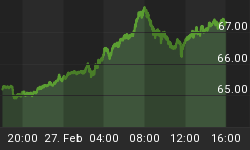"Smart Money" sees A Bargain in Berkshire Shares
A 52-week low, a long track record, and a modest valuation -- even Buffett would buy, writes Dave Kansas ...Berkshire shares look remarkably cheap.
Berkshire hit $109,925 on Wednesday, its lowest level since June 2010. They have since recovered a bit to trade above $112,000, but the shares are still down about 14% since a Feb. 28 high of $131,300. Berkshire's shares haven't traded below $100,000 since January 2010. Berkshire's B shares, which trade at about $75, have performed in similar fashion.
At the end of the first quarter, Berkshire had a book value of $97,081 a share. That means Berkshire is trading about 1.15 times book value. According to Barclays, Berkshire's historical median valuation is about 1.7 times book value, and 1.1 times book value is about as cheap as Berkshire has gotten in past decade. Its historical price/book multiple since 2000 has been about 1.6. That would be about $155,000 a share based on first-quarter book value.
Buffet Already Bought
Of course Buffett would buy. He already did.
The mistake is thinking that "values" of the past decade constitute real value that the market will recognize anytime soon.
Take a look at Citigroup. Yahoo Finance reports Citigroup Trades at Price/Book of .64
Lovely. Had you bought at price to book of 1.0 (a tremendous "value" to many) you would be 36 percent in the hole.
Take a look Bank of America. Yahoo Finance reports Bank of America Trades at Price/Book of .50
Had you bought Bank of America at "book value" you would be down 50%.
Had you bought Citigroup near its peak you would be down 90% or more with a 0% chance of ever getting even.
Value Trap
Does "book value" constitutes real value? How much of the book value of Citigroup and Bank of America is based on nonsensical not marked-to-market holdings?
Ask the same of Berkshire.
Even if you conclude Berkshire constitutes real "value", what if the market does not recognize that "value" for a decade or even two?
That question may sound silly but it is not.
Many stocks in the Japanese Nikkei index trade at or below book value and have for years. Please consider the following chart of the Nikkei.
Nikkei Chart Since 1989

The Nikkei peaked above 38,000 in 1989. Two decades later it sits below 10,000.
Like the results?
Of course you don't.
Yet, I would rather place my bets on companies following a 20-year washout than on financial, insurance, or reinsurance businesses (or other value traps) that the market might not recognize for decades, if indeed ever.
Sentiment Matters
Based on "value", Japanese stocks were cheap in 1995, cheaper in 1999, even cheaper in 2005, and preposterously cheap now.
On a similar basis, Berkshire shares may be "cheap" now but why should anyone care if the market may not recognize that for another decade?
The first problem is finding something that is genuinely cheap. Citigroup and Bank of America looked "cheap" all the way down.
The second problem is book values may be overstated. Does anyone really believe the book value of Citigroup or Bank of America? On the same basis, why should anyone believe the book value of Berkshire?
The third problem is timing what is genuinely cheap. The third problem pertains to PE compression cycles. What was "normal" for the past decade has nothing to do with "normal" at all. PE ratios expanded to enormous heights and now we are in a period of PE contraction.
Thus, assuming one does believe Berkshire is undervalued (I don't) , is there any reason to suspect the market will recognize that "value" anytime soon?
Negative Results For Another Decade
If you think Berkshire is a scorching buy, please consider the following:
- Negative Annualized Stock Market Returns for the Next 10 Years or Longer? It's Far More Likely Than You Think
- Anatomy of Bubbles; Negative Returns for a Decade Revisited; Is Gold in a Bubble?
Count me in the group that says earnings estimates are horrendously overstated and unsustainable.
However, let's assume I am wrong about earnings.
Assume Berkshire is a "screaming buy" based on earnings or other metrics. What difference does it make if it takes the market 10 years to recognize that point of view?
Reversion to the Mean
My point is that not only will earnings revert to the mean, but so will P/E valuations. That is a double whammy to stocks in general and applies to Berkshire as well.
If "either" earnings or valuations revert to the mean, it spells problems for equities at current valuations.
Berkshire, Bank of America, and Citigroup are all dead money "value traps" and may be for a decade just as Intel and Cisco were after the dotcom bust.















